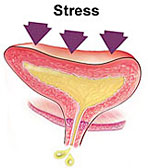
The Potassium Chloride Sensitivity test consists of instilling 2 sterile solutions of sodium chloride and potassium chloride, known chemically as KCl, into the bladder via a urethral catheter which your nurse or consultant will insert. The test can take up to 30-40 minutes. It has been suggested for two uses: Diagnostic test for Interstitial Cystitis…

Dietary Recommendations You have been given this leaflet because you have been diagnosed with urinary stones. The aim of the leaflet is to provide you with advice on how to modify your diet and fluid intake to reduce your risk of getting further stones. Key Points ? Drink plenty of fluid: 2-3 litres per day…

Basic facts everyone should know: Kidney stones are among the most common—and painful—disorders of the urinary tract. Each year, thousands of Americans are diagnosed with kidney (renal) stone disease, a condition that develops when the urine becomes overly saturated with certain microscopic substances. They form crystals that eventually bind into hardened mineral deposits, known as…

What is stress urinary incontinence? Urinary incontinence is leaking of urine. It is not a disease but it is a symptom of many other health conditions, some surgery or even childbirth. More than 15 million Americans, mostly women, suffer from incontinence. Although it is more common in women over 60, it can occur at any…
What Causes Urinary Incontinence? Urinary incontinence is not a disease. It is a symptom of a wide range of conditions. These may include diabetes, stroke, multiple sclerosis, Parkinson’s disease, some surgeries or even childbirth or menopause* for women. Certain types of medications can cause or make incontinence worse. These medications include diuretics, sedatives, narcotics, antidepressants,…
What is stress urinary incontinence? Urinary incontinence is leaking of urine. It is not a disease, but it is a symptom of many other health conditions, and can occur after surgery. More than 15 million Americans suffer from incontinence. Although it is more common over 60, it can occur at any age. In general, more…